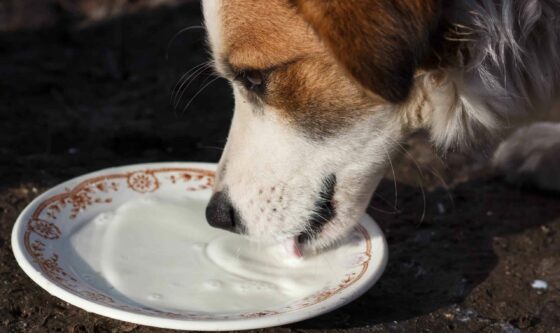Can Dogs Drink Milk?
Small amounts of organic cow’s milk offer your dog protein, vitamins and healthy fats. Milk can cause digestive upset in lactose intolerant dogs though, and contribute to inflammation, allergies and chronic ear and skin infections. Try alternatives like unsweetened, organic coconut, oat, goat or almond milk.
In some dogs, cow milk offers a good source of nutrition, but can still contribute to stomach upset, skin irritation, weight gain or potentially fatal pancreatitis. Alternatives such as plant-based or goat’s milk can offer excellent nutrition with fewer downsides.
Is Milk Nature’s Health Food?
 The upside of cow’s milk is that it provides several nutrients, most of which are healthy for dogs:
The upside of cow’s milk is that it provides several nutrients, most of which are healthy for dogs:
- protein – like whey and casein
- vitamins – like calcium, phosphorous, riboflavin, vitamins A and B12, potassium, magnesium and zinc; Vitamin D is added to milk when it is pasteurized
- enzymes – such as lactase, alkaline phosphatase, amylase and lipase (present only in raw milk; enzymes are deactivated when milk is pasteurized)
- probiotics – (present in raw milk only – pasteurization kills most healthy and unhealthy bacteria)
- sugars – lactose
- healthy fats – saturated, polyunsaturated, monounsaturated and trans fats
- hormones – such as insulin-like growth factor, bovine growth hormone and several others that naturally occur in cow’s milk to support the growth of newborn calfs
 The downside is that cow’s milk can contribute to health problems in dogs such as:
The downside is that cow’s milk can contribute to health problems in dogs such as:
- food sensitivities and allergies
- stomach upset
- chronic skin conditions
- chronic infections
- pancreatitis
3 Things to Know Before Giving Cow’s Milk to Your Dog
Before giving milk to your dog, you need to be aware of how these three things can affect your dog:
- your dog’s ability to digest lactose
- the fat content in milk
- the type and quality of milk
Lactose
Milk contains a natural sugar called lactose. In order to break down lactose into usable parts, people and dogs need an enzyme called “lactase”. Dogs have varying amounts of the enzyme lactase needed to break down lactose. If they can’t break down this milk sugar, they can suffer upset stomach.
Symptoms of Lactose Intolerance in Dogs
Your dog may be lactose intolerant if you notice any of these signs after he drinks milk or eats food that contain milk (e.g. ice cream, whipped cream):
- gas or flatulence
- diarrhea or loose stools
- nausea (grass eating is a common sign of nausea in dogs)
- vomiting
Although it’s difficult to estimate how many dogs can or can’t tolerate lactose, over half of dogs in one study were able to tolerate high amounts of lactose without digestive upset. Unfortunately, the best way to determine whether your dog is lactose intolerant is to watch for the signs – and that’s not pleasant for dogs or pet parents.
Isn’t Milk Good for Puppies?
 Great question!
Great question!
Yes – young puppies thrive on their mother’s milk for a short time, until they are weaned off milk and onto solid food. During this time, the puppy has enough of the lactase enzyme to digest mother’s milk. Additionally, mother’s milk has relatively low levels of lactose to begin with (lower than cow’s milk). After weaning, a puppy’s ability to digest lactose decreases into adulthood.
Puppies have enough of the enzyme needed to digest mother’s milk until they are weaned onto solid food.
But there’s more to milk than just lactose.
Fat Content in Milk
Dogs need fat to fuel their energy needs and to maintain healthy skin, coat, nerves, nutrient absorption, reproduction and immunity. The amount of fat in typical canine diets ranges from 6-50%. Working dogs, pregnant dogs and high energy breeds typically require the highest levels of fat. Obese dogs or those with pancreatitis need less fat – so adding milk to a balanced diet can lead to overweight or potentially fatal pancreas disease.
Healthy and Unhealthy Fats in Milk
Whole milk contains about 3.5% fat in the form of both healthy and unhealthy fats. Healthy fats include Omega-3 and Omega-6 and are essential in the right amounts to optimize health and prevent disease. Most people know unhealthy fats as “saturated fats”. Although milk contains both these fats, the quality of milk plays a significant role in determining whether the fat in milk contributes to good health or not.
Research tells us that organically fed, pasture-raised dairy cows have up to 62% higher levels of healthy omega-3 fats than conventionally raised cows. So if you’re simply looking for healthy fats, choose milk from organic, pasture-raised cows. If you think a lower fat milk is a better choice, be aware that lower-fat options can increase risks of diabetes and obesity.
As with most food products, quality and manufacturing can affect the health benefits.
Quality of Milk
Quality is extremely important.
Raw, unpasteurized, non-homogenized milk from organically and humanely raised cows provides the highest level of nutrition. Unfortunately, most commercial milk is far from this ideal. Cows are commonly raised in stressful crowded conditions, fed genetically modified feed, and given hormones, antibiotics and other drugs that linger in their milk.
On top of that, natural milk is processed through pasteurization and homogenization.
Pasteurized Milk
Pasteurizing milk increases shelf life by cooking natural milk with the goal of killing harmful bacteria, yeast and mold. However, it also destroys beneficial vitamins, proteins and enzymes and makes fat acids go rancid. And ironically, it doesn’t kill antibiotic-resistant bacteria like salmonella.
Homogenized Milk
When milk is homogenized, its natural fat molecules are broken down in order to mix with the milk, rather than left to naturally separate and float on top. The mixed fat can then bypass the digestive process and enter the bloodstream directly. Although evidence is lacking, some health experts theorize that homogenized milk can affect allergies, pH levels and hormone-mediated diseases.
Is Milk Bad For Dogs?
There are some cases where cow’s milk can cause digestive problems (like lactose intolerance) or aggravate chronic conditions. Never give dogs chocolate milk or sweetened milk, as chocolate and artificial sweeteners like xylitol can be fatal.
Inflammation and Chronic Health Conditions
Dairy is cited as a common source of inflammation in people and animals. Sugar and proteins (like whey) found in dairy are the most common causes of inflammation and food sensitivities. Research indicates there are more than 20 proteins in milk that can cause allergies or sensitivities. In addition, low quality dairy can contain hormones, antibiotics, genetically modified organisms and other drugs that worsen inflammation and health problems like allergies, chronic ear or skin infections.
What are the Best Milk Options for Dogs?
If you want to optimize your dog’s nutrition with milk, start with small amounts of organic cow’s milk to see how your dog responds. Or, consider one of these alternatives:
- goat milk
- soy milk
- almond milk
- oat milk
- coconut milk
- cheese
Can Dogs Drink Goat Milk?
Many experts consider goat milk to be a complete source of nutrition and recommend it to assist dogs who are healing from illness, injury or side effects of medical treatments such as poor appetite.
Many experts consider goat milk to be a complete source of nutrition and recommend it to assist dogs who are healing from illness, injury or side effects of medical treatments such as poor appetite.
Goat milk is superior to cow milk in several ways. It’s:
- higher in vitamins and protein
- easier to digest
- 12% lower in lactose
- nearly 2x higher in calcium
- better able to absorb trace minerals
- slightly higher in fat (4%) than cow milk – which can be good for working or pregnant dogs, but may not be suitable for dogs on a low fat diet
- full of probiotics for gut health and immunity
Raw Goat’s Milk
Raw goat’s milk is simply milk direct from the goat, in its purest form – without processing through pasteurization and homogenization.
Benefits of Raw Goat Milk
If your state or province allows raw (unprocessed/unpasteurized) goat milk, your dog gets these added benefits:
- prebiotics that feed healthy gut bacteria (6x more than cow milk)
- probiotics to support digestion and immunity (over 200 species of good bacteria)
- inflammation-reducing properties that stabilize mast cells and act as an antihistamine
- caprylic acid (helps to reduce yeast, common cause of ear infections)
- supports optimal digestion and absorption of nutrients from more than 60 live enzymes
Is Goat Milk Good for All Dogs?
Goat milk is a healthy treat for most dogs, however there are some cases where you might avoid cow and goat milk products altogether:
- For dogs who are lactose intolerant, even small amounts can cause distress
- For dogs who are immunocompromised including those with cancer. Check with your Holistic Vet before giving raw, unpasteurized goat milk, as some proteins can increase inflammation.
- If your dog has digestive issues or skin conditions, work with a Holistic Vet to determine underlying causes; milk products may not be advisable
- Obese dogs or those with pancreatitis may find the fat content in goat or dairy milk too high
If your dog is lactose intolerant or otherwise unable to digest cow’s milk, there are several plant-based options.
Can Dogs Drink Soy Milk?
Soy milk is high in protein and made from soya beans. Unfortunately, soy is also one of the top allergens in dogs – due to its higher protein content. If your dog doesn’t have a known allergy to soy, you can offer small quantities – just make sure there is no added sugar or flavour. Sugar is often used to prepare soy milk, so dogs that regularly drink soy milk can be at higher risk for diabetes, obesity and tooth decay. Also, ensure the soy milk is organic and not genetically modified. This helps avoid high amounts of pesticides like glyphosate (RoundUp). High amounts of soy can have estrogen-like health effects or even lower the level of thyroid hormones.
Can Dogs Drink Almond Milk?
Almond milk is another option for your dog, as long as there are absolutely no flavourings, sweeteners or additives. Xylitol is an artificial sweetener sometimes added to plant-based milk and is deadly to dogs. Amongst plant-based milk, almond milk has a higher amount of fat which could contribute to your dog’s weight gain, digestion problems (diarrhea) or pancreas issues, if he is prone to that. On the other hand, working dogs or pregnant dogs may benefit from the higher amount of fat. Almond milk is kinder to the environment (and animals) than dairy milk, although it requires a relatively enormous amount of water to process, posing concerns for drought-prone regions.
Can Dogs Drink Oat Milk?
Oat milk is safe option for dogs and is easy on their digestive systems. Like all non-dairy milks, make sure there is no added sugar or flavour. Also, be aware that oats have high amounts of fibre, so give your dog oat milk in small amounts, and watch for constipation or diarrhea. Always buy organic oat milk to avoid or minimize the health risks associated with crop pesticides like Roundup (glyphosate).
Can Dogs Drink Coconut Milk?
In small amounts dogs can drink plain, unsweetened coconut milk. Organic milk is preferred and try to avoid milk that contains carrageenan and xanthan gum, as they can be irritating to a dog’s digestive system. Coconut can have a high fat content, so keep amounts small, especially for overweight dogs. Never give your dog a whole coconut as the husks can get caught in his throat and digestive system.
What About Milk Products Like Cheese?
 Dogs love cheese, right? Cheese is generally high in protein and lower in lactose than most dairy products. Some cheeses are a good, nutritious snack, while others can harm your dog. Before giving your dog a cheese snack, make sure you know about salt, additives, mould-based cheeses and which ones are the safest. Find out the best and worst cheeses for your dog with our Ultimate cheese guide for dogs
Dogs love cheese, right? Cheese is generally high in protein and lower in lactose than most dairy products. Some cheeses are a good, nutritious snack, while others can harm your dog. Before giving your dog a cheese snack, make sure you know about salt, additives, mould-based cheeses and which ones are the safest. Find out the best and worst cheeses for your dog with our Ultimate cheese guide for dogs
Be kind to all beings. Respect the earth we share
References
Benbrook, C., Butler, G., Latif, M. Et al (2013). Organic Production Enhances Milk Nutritional Quality by Shifting Fatty Acid Composition: A United States–Wide, 18-Month Study. PLoS One Collection: Animal Welfare 8(12). https://doi.org/10.1371/journal.pone.0082429
Grandi, M., Pinna, C., Bonaldo, Al et al (2018). Effects of dietary supplementation with increasing doses of lactose on faecal bacterial populations and metabolites and apparent total tract digestibility in adult dogs. Italian Journal of Animal Science 17(4). https://www.tandfonline.com/doi/full/10.1080/1828051X.2018.1459210
Ye, A., Cuir, J., Dalgleish, D. & H. Singh (2017). Effect of homogenization and heat treatment on the behavior of protein and fat globules during gastric digestion of milk. Journal of Dairy Science. 100 (1), 36-47. https://www.sciencedirect.com/science/article/pii/S0022030216307883







